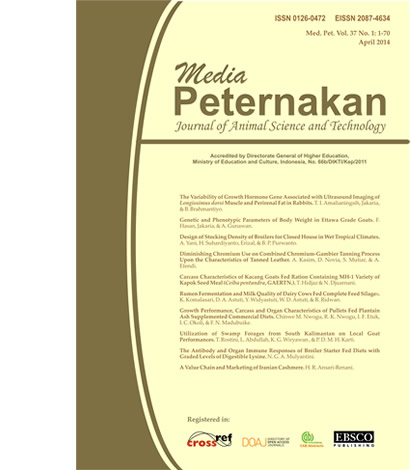The Antibody and Organ Immune Responses of Broiler Starter Fed Diets with Graded Levels of Digestible Lysine
Abstract
The objective of the study was to investigate broiler immune responses during the starter phase to graded levels of digestible lysine. This experiment used 175 mixed sex broiler chickens from 1 to 21 days of age. Seven chicks were selected and allocated to each floor pens. Chicks were fed experimental diets from one day old to 21 days of age. Dietary treatments included the following levels of digestible lysine: 6.0, 8.0, 10.0, 12.0 and 14.0 g/kg diet. Supplemental synthetic L-Lysine-HCl which was considered to be 100% digestible was added to diets to obtain the concentration of the digestible amino acid. At 21 days of age, two chickens from each pen with body weights close to the pen mean were selected for evaluation of immunological variables. Immune organs (spleen and bursa), cellular immune response (skin test), and antibody production against infectious bronchitis virus (IBV) were determined. Blood samples (plasma) were taken from the same birds to determine antibody titer against IBV. The birds were euthanized, and immune organs (spleen and bursa) were removed, and weighed individually. The results showed that spleen and bursa weight of birds fed diet containing 6.0 g/kg digestible lysine was significantly lower than those given diet containing 10 to 14 g/kg of digestible lysine. Toe web thickness of chickens fed diet containing 6.0 g/kg digestible lysine was significantly lower than the birds fed diets containing 14 g/kg digestible lysine. In conclusion, diet containing 8.0 g/kg appeared to have greatest potential to modulate immune response among other levels. However increasing levels of lysine did not have significant effect on antibody production.
Key words: amino acid, lysine, broiler, digestible



